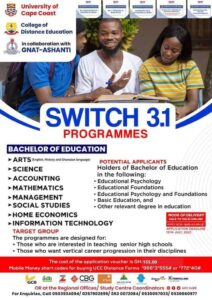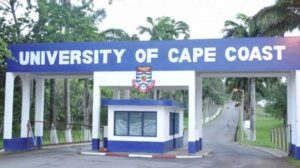ECONOMICS COURSES IN UCC

UCC ECONOMICS DEPARTMENT
Degree Type:
Bachelor of Arts
Department:
Department of Economics Studies
Modes of Study:
Regular
UNIVERSITY OF CAPE COAST ECONOMICS
BA Economics is a four-year degree program that provide students with a strong foundation and understanding of core microeconomic and macroeconomic theory.
The program is enriched by the provision of empirical skills that are key to applying economic thinking in our increasingly data-driven world.
Besides the rigorous training in both theory and econometrics, students are given the opportunity to select elective courses from a wide range of electives in economics to fit their likely targets of interest, ranging from Labor market issues, Health Economics, Environmental Economics, Financial Economics to Development Economics, and many more.
Entry Requirements:
The Minimum Admission Requirement into the University of Cape Coast for WASSCE applicants is aggregate 36. For SSSCE applicants, the minimum requirement is aggregate 24.
Candidates must have credit passes in six (6) subjects with overall aggregate of 36/24 at the WASSCE/SSSCE respectively.
Three of the six subjects must be core subjects: English Language, Mathematics, Integrated Science or Social Studies and three must be in relevant electives (which must include Economics and Elective Mathematics).
B.Sc. (Mathematics with Economics) cut-off point is 19. That is to say that an applicant has to obtain an aggregate of 19 if he or she wants to study BSc. Mathematics with Economics
Career Opportunities:
Social Science is the study of society, and the relationships that exist among people in a society. In this programme, Economics, which is a major aspect of social science, is the main focus. Economics is concerned about the study of management of scarce resources.
It examines the production, sale and use of goods and services. Other aspects of social science including sociology and geography are also studied. Economics examines how people, communities, companies and countries apportion the resources available to them as they attempt to meet their insatiable needs.
Students are taught how to plan and prioritize the use of available resources. Whether operating a business, running a community, governing a nation, or managing one’s personal life, a more than an average knowledge in economics is vital.
Students are taught to be analytical in their thinking, critical in their examination of micro and macroeconomic situations, and are equipped with the skills to be able to accurately project what an economy would look like in months or years to come.
Programme Structure
Level 100
First Semester
CMS 107: COMMUNICATIVE SKILLS I
Second Semester
CMS 108: COMMUNICATIVE SKILLS II




